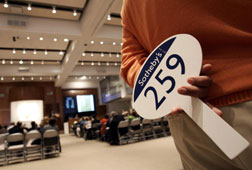Why Do Auctioneers Talk Like That?
To put you in a trance.
The U.S. Marshals service auctioned off $2.2 million worth of jewelry, shoes, and other possessions that once belonged to disgraced financier Bernie Madoff on Saturday. According to the Associated Press, an auctioneer rattled off lots "at a tongue-twisting speed." That reminds the Explainer of one of the column's top "Unanswered Questions" from 2009: Why do auctioneers talk like that? Good question!
They talk like that to hypnotize the bidders. Auctioneers don't just talk fast—they chant in a rhythmic monotone so as to lull onlookers into a conditioned pattern of call and response, as if they were playing a game of "Simon says." The speed is also intended to give the buyers a sense of urgency: Bid now or lose out. And it doesn't hurt the bottom line, either. Auctioneers typically take home from 10 to 20 percent of the sale price. Selling more items in less time means they make more money.
Think you've got the chops to be an auctioneer? There are about 50 schools in the United States where you can spend a few days honing your skills. Twenty-seven states require auctioneers to be licensed. In half of those states, you need to accrue approximately 80 hours of training; otherwise you can complete an apprenticeship or, in some states, just sit for the exam. Only a few states make you stand up and auction an item as part of the test. Most of the written questions deal with auctioneering ethics and legal obligations.
The auctioneer's cadence must be learned and practiced. Start by chanting pairs of numbers in ascending order (1, 1, 2, 2, 3, 3, etc.), then do them backward. When you can work in conversational banter without breaking your rhythm or losing track of the count, you've got it down. Take brief, shallow breaths at regular periods in between the bid calls. Avoid difficult sounds that strain your throat, like K or a hard G. The pros keep their vocal cords loose by chanting in the shower or in the car on the way to a show. Tongue-twisters are a great way to stay in shape. Try this one: A big black bug bit a big black bear. Say it faster and faster, but keep a steady rhythm, holding the final syllable for an extra beat before starting again.
Tim Kruse of the Reppert Auction School practices a tongue-twister:
A professional must also learn how to squeeze out every last dollar from a sale. If two people are bidding each other up, for example, a good auctioneer will start talking directly to them, cocking his head back and forth and gesturing to them as he urges them on. The sense of competition is thought to move people past their predetermined price limits.
No one knows exactly when auctioneers started talking that way (although the National Auctioneers Association has made a serious effort to investigate the question). Public auctions have been around since well before the nation's founding but became very common during the Civil War, when military officers unloaded seized property to the highest bidder. (That's why today's auctioneers sometimes bear the title "Colonel.") But there's no evidence that men of the Blue and Gray used today's auctioneering cadence. Some speculate that tobacco auctioneers, still known as some of the most skilled practitioners, might have developed the style when the public leaf auctions spread from Virginia into other states after the Civil War.
The fast-talking auctioneer is a uniquely American tradition. The people who work at the largest auction houses in the world, Christie's and Sotheby's, employ a more restrained British style of auctioneering. In the United Kingdom, many auctioneers don't solicit specific bids, instead declaring the price and asking for "advances on the current bid." Buyers are expected to know the predetermined bid increments.
Got a question about today's news? Ask the Explainer.
Explainer thanks Tim Kruse of Reppert Auction School and Chris Longly of the National Auctioneers Association.
